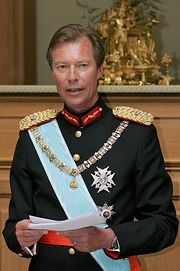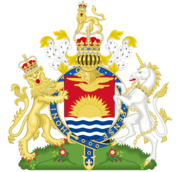Victor Emmanuel I
| Victor Emmanuel I | |
|---|---|

| |
| Victor Emmanuel I addressing the Political Club, Westminster in August 2011 | |
| King of Kiribati and Tarawa | |
| Reign | 30 April 1990 – present |
| Coronation | 12 May 1990 |
| Predecessor | Umberto IV |
| Prime Ministers | Catherine Willoughby Thomas Attenborough Arthur Langley Andre Torre Iain McDowell Maxwell Monaghan |
| Spouse | Mary Bowes-Lyon (m. 1984) |
| Issue | Edward, Prince of Norfolk George, Duke of Lancaster Anne, Duchess of Nottingham Sophia, Duchess of Cambridge Catherine, Duchess of Stanford |
| House | House of Grimaldi |
| Father | Umberto IV of Kiribati-Tarawa |
| Mother | Princess Annemarie of Prussia |
| Born | 22 March 1958 (age 56) Whitehall Palace, Westminster |
| Religion | Church of Tarawa |
Victor Emmanuel I (full name: Victor Emmanuel Jean-Michel George William Umberto, born 22 March 1958) is the reigning King of Kiribati-Tarawa. On 30 April 1990, he succeeded his father, Umberto IV. He is the only son of Umberto IV of Kiribati-Tarawa and his wife, Princess Annemarie of Prussia.
Upon his ascension to the throne on 30 April 1990, the King became Head of the Kiribatian Commonwealth and thus also became King of the twelve commonwealth realms, as well as the King of the eleven Kiribatian overseas territories. He inherited the throne amidst domestic turmoil; the Kiribatian economy was stagnating, foreign threats loomed from abroad, the price of petroleum had doubled in less than a year, and the people of Kiribati-Tarawa wanted a strong King who could reform the country. His father, King Umberto IV, was considered by many to be incompetent. He did not busy himself with the affairs of the kingdom and instead focused on his own personal dealings. The new King, Victor Emmanuel, took on an aggressive policy towards combatting the issues facing Kiribati. He is often criticised as being too interventionist in his dealings with Parliament, so much so that, in 2001, a group of Labour MPs formally demanded his abdication, which he rejected.
As monarch, he is head of state and commander-in-chief of the armed forces. He is married to lady Mary Bowes-Lyon, the daughter of a wealthy Earl, with whom he has five children.
Contents
Early life
Victor Emmanuel was born in Whitehall Palace in Westminster, the principal the residence of the Kiribatian monarch, on 22 March 1958 to Umberto IV of Kiribati (then Umberto, Prince of Norfolk). He was christened at the Cathedral of Saint Thomas Aquinas in Westminster on 5 August 1958 by the Archbishop of Westminster John Connolly. His godparents were Augusta-Sophia von Hohenzollern (his maternal grandmother), Johan Michael von Hohenzollern (his maternal uncle), Augustina Grimaldi, Duchess of Salisbury (his paternal aunt), and George VII, King of Kiribati-Tarawa (his paternal grandfather).
Prior to becoming the Prince of Norfolk when his father inherited the throne, Victor Emmanuel held the title Duke of Oxford.
Youth and education
Early years
Prior to his father's ascension to the throne in 1980, the Prince of Norfolk, his wife, and his only son, Victor Emmanuel, lived a quiet life away from Westminster at Summerhall House in Devonshire. The remote, isolated beach house was built as a summer residence for the Prince, and its existence was not known until recently. The Prince of Norfolk, Umberto (the future Umberto IV) highly valued solitude and wanted to spend as much time away from court as possible. The family spent the entirety of the summer months at Summerhall House, returning reluctantly to Westminster for the winter.
As is customary for members of the royal family, Victor Emmanuel did not attend school before attending university; rather, he was tutored by Sir William Wolsey, a well-respected Kiribatian scholar and academic. The future King established a close personal bond with his tutor; upon Wolsey's death in 2006, the King arranged and paid for a state funeral to be held for him, at the expense of the Crown.
At the age of 18, the then Duke of Oxford attended the University of Westminster, where he studied foreign relations, and at the age of 22, his father inherited the throne, thus making him the new Prince of Norfolk.
As Prince of Norfolk
When Victor Emmanuel was 22 years of age, his father, Umberto, inherited the throne and reigned as Umberto IV. His father's ten-year reign, however, was overshadowed by political and constitutional crises in Parliament, scandals involving several Cabinet members, as well as external forces, such as the Kiribatian-Waldensian Cold War and the rising price of petroleum, brought on by an embargo by OPEC. The King, being a private man, made very few public appearances, and thus support for and confidence in the monarchy hit an all-time low during Umberto IV's reign. In addition, Umberto's father, George VII, left behind very little money in the Crown Estate, and in 1984, the Crown filed for bankruptcy.
In order to solve his father's financial troubles, Victor Emmanuel married Mary Bowes-Lyon, the daughter of the very wealth oil magnate and Earl Geoffrey Bowes-Lyon, the 7th Earl of Marbury. Victor Emmanuel's new father in-law agreed to bail out the Crown Estate.
Marriage and family
In 1984, King Umberto IV, Victor Emmanuel's father, was nearly bankrupt and was forced to sell off many royal estates. The Crown Estate had invested too money in risky investments, many of which fell through. In order to raise funds for the Crown, King Umberto arranged a marriage between his son, Victor Emmanuel, and lady Mary Bowes-Lyon, the daughter of a newly-rich Earl, Lord Geoffrey Bowes-Lyon, the 7th Earl of Marbury, who had recently found oil deposits on his barren farming estate and had made a fortune extracting and selling crude oil.
The first few years of the marriage was, reportedly, loveless, and acknowledged as a duty rather than a passion. However, Victor Emmanuel and Mary grew to love one another over time. In his memoir, the King writes, "Mary is my queen, my best friend, and the mother of my children. What more could I possibly ask for?" Mary and the King's marriage is reportedly quite happy, and the two have five children together.
- Edward, Prince of Norfolk (born 7 January 1985). He is married to Annabella Guédry-Lévesque, a Leasathi aristocrat.
- William, Prince Royal (born 29 August 2014). He is third in line to inherit the throne.
- George, Duke of Lancaster (born 16 April 1987).
- Anne, Duchess of Nottingham (born 22 May 1991).
- Sophia, Duchess of Cambridge (born 25 January 1993).
- Catherine, Duchess of Stanford (born 11 March 1996).
Reign
Ascent
Victor Emmanuel I was crowned at the Cathedral of Saint Thomas Aquinas in Westminster, Kiribati's coronation church, by the Archbishop of Westminster in 1990, following the death of his father, Umberto IV. At the time of Umberto's death, the state of Kiribati, and the monarchy in particular, was tumultuous. The reputation of the monarchy had been diminished by the reign of his father. Umberto IV's private tendencies, rare public appearances, Parliamentary scandals, and external factors had reduced faith in the monarchy.
On the day of his coronation, the King gave a public speech, aired on all major television channels, making him the first Kiribatian monarch to give a public address. The speech was the first step of many in the King's plan to restore the reputation of the monarchy. The speech, which was not about any subject in particular, was well-received, and brought the monarchy closer to the people in the eyes of many.
Modernisation
Despite the tumult in the early part of his reign, the King's popularity and that of the monarchy has recovered markedly, due in large part to Victor Emmanuel's efforts to modernise the monarchy.
Titles, Styles, Honours, and Arms
Titles and Styles
Victor Emmanuel has held numerous titles throughout his life, first as the grandson of the monarch, then as son of the monarch, and finally as monarch in his own right. In Kiribati and Tarawa proper, he is known as King of Kiribati, Tarawa, and the overseas dominions. As the Kiribatian monarch, he is also the Head of State of each of the commonwealth realms. In the commonwealth realms, he has a distinct title which follows this formula: King of New Tarawa and his other realms and territories (for New Tarawa, for example).
The King also has a role in the Church of Tarawa. Since the Reformation in the 1500s, the monarch has also held the titles of Supreme Governor of the Church of Tarawa and Fidei Defensor, or Defender of the Faith.

